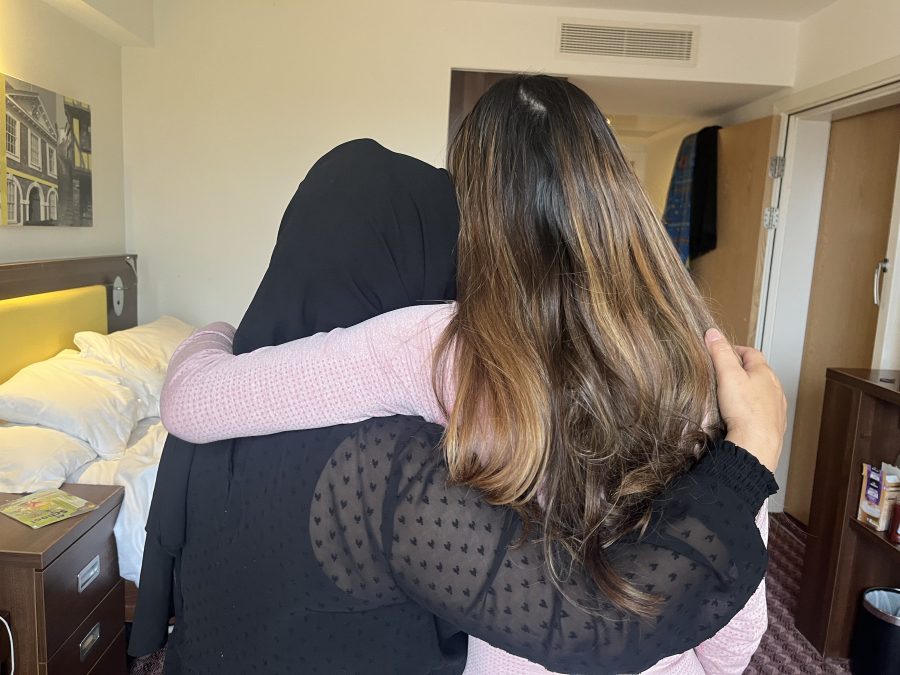A string of fairy-lights is the only item dividing the hotel room Shayan, 12, shares with her 14-year-old brother, Roman. In her ‘half’ of the room – slightly larger than the single bed she sleeps in – is a neat stack of shoe boxes she uses for her notebooks, make-up and jewellery. When I visit, the room is airless: the blinds are drawn all day to stop outsiders from seeing in, and the windows are sealed shut for safety. The air conditioning doesn’t always work and, although the coast is only a few miles away, Shayan’s family rarely leave the hotel.
‘We’ve spent thousands of pounds just to get into England. And what for? To be stuck in a hotel, to get harassed and for my parents to not be allowed to work.’
It hardly seems appealing for a stay of even one night. But this is the sort of situation Shayan has been living in for the past nine years after her family fled Iraq and entered the UK immigration system.
‘Our parents wanted a better future for us. That’s why they came here,’ she tells me. ‘We’ve spent thousands of pounds just to get into England. And what for? To be stuck in a hotel, to get harassed and for my parents to not be allowed to work.’
I got to know Shayan and her family after I gained access to four migrant hotels this summer. Journalists aren’t allowed inside asylum-seeker accommodation, but I went behind the security cordon as a visitor, invited by some of the residents I had met in migrant camps in France. As protests took place across the country and hotels because a focal point of the debate about UK immigration levels, I wanted to discover what life was really like inside.
Even as a BBC journalist with more than 20 years of experience reporting on people smuggling and small boat crossings, I found the situation stark. I met asylum-seekers who believed that having a baby in the UK would help with their claim or improve access to benefits and better housing. I saw how many migrants were accessing jobs on the black market and working for cash, despite being forbidden from working while their applications are considered. I witnessed the constant back-and-forth of taxis for journeys long and short – paid for by the UK government, at a total cost that nobody in the Home Office was able, or willing, to share with me.
I met migrants who openly admitted they had come to the UK to access medical treatment they couldn’t afford in their home countries. When I interviewed an Iraqi woman with stage four cancer whose asylum claim had already been rejected by the Home Office, she told me she had lodged an appeal knowing the process could take years. During this time, she said, she hoped to continue accessing NHS treatment.
Shayan’s father, Kadir, told me he was sceptical about plenty of the asylum-seekers in the hotel with him and his family. ‘Many of them, they don’t have an issue. They just come to change their life,’ he claimed. ‘They have a nice car, they have a nice house, they have everything. But because some of their family live in the UK, they say “come here, you’ll have a better life because Britain has money”.’
My investigation was broadcast on BBC Radio 4’s File on 4 last week and immediately created headlines. Home Secretary, Shabana Mahmood, promised a review into the costs of transporting asylum-seekers to medical appointments, spurred perhaps by one taxi return trip I was told about that had cost £600. The Prime Minister Keir Starmer responded to the report by saying he was committed to ending the use of hotels for asylum-seekers, adding: ‘I want to see them emptied as quickly as possible.’
And then, as often happens, the news cycle moved on. The PM sparked a row with Reform voters after saying the party’s plan to axe the indefinite leave to remain status was ‘racist’. The Home Secretary told the Labour party conference that migrants must earn the right to live in the UK. The focus, once again, returned to curbing immigration at the root. Meanwhile, the question lingered: What of those already in the system – some 100,000 people at an annual cost of around £2.1 billion?
When I put this to Curtis, a security officer at one hotel, he told me he had sympathy for many of the asylum-seekers he guards. But he would welcome the Home Secretary’s tougher migration policy – he believes there needs to be structure and requirements for those at the hotel, too. Curtis suggested language classes should be compulsory, asylum-seekers’ days should be timetabled to curb illegal working, and they should be made to contribute to hotel life rather than relying on cleaning staff. ‘If you’re living in a place like this, you need to learn to treat it like your home,’ he said. ‘Are you telling me that where you came from before you got here, everything was done for you?’
Curtis believes the UK could learn from Germany, which has unveiled plans to accelerate deportations, prioritise skilled workers and manage ‘integration’ via comprehensive language courses. That way, he thinks, those whose claims are successful will obtain better paid jobs and contribute more to society.
Days after my report, an asylum-seeker I’d met called to say hotel operators were trying to identify migrants who had spoken to me. He’d received an official letter that warned: ‘Under no circumstances are members of the press or media allowed to be brought on to the premises in the disguise of a visitor.’ He was angry, he told me, ‘because there’s no freedom to talk. They don’t want anything from inside the hotel to go outside the hotel. They try to hide everything inside the hotel’.
Some of that may now have been brought into the open. And yet, as the debate rumbles on, there seems no end in sight for the costly loop of migrant hotels.







Comments